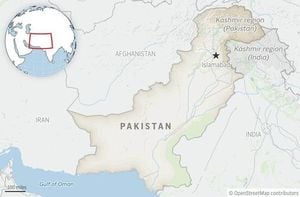Four years after the Taliban’s return to power in Afghanistan, the country stands at the crossroads of crisis and cautious engagement. The regime’s hardline policies have upended the lives of millions, especially women and minorities, while the international community and regional neighbors wrestle with how best to respond. Against this backdrop, stories of resilience, shifting alliances, and political calculations are playing out on the world stage—and in the quiet determination of individuals like Omulbanin Sultani, a young Afghan woman whose dreams of becoming a doctor were nearly extinguished by the Taliban’s sweeping restrictions.
According to BBC Scotland News, Omulbanin Sultani, 22, was one of 19 Afghan women brought to Scotland a year ago through a program organized by The Linda Norgrove Foundation and supported by the UK and Scottish governments. Forced to abandon her medical studies when the Taliban banned women from universities in December 2022, Omulbanin now studies at St Andrews University, determined to become a dermatologist. She estimates it will take ten years to qualify, but her motivation remains unshakable. “If I was not engaged to him, I wouldn’t be able to come here and to make my dream come true,” she said of her fiancé, left behind in Afghanistan. “He’s one of my motivations and why I want to continue this sacrificing. It’s joyful to imagine the days that are waiting for me.”
Her journey is emblematic of the broader struggle facing Afghan women. The Taliban’s restrictions, especially the education ban for girls above age 12, have erased opportunities for millions. As Omulbanin told BBC, “The night before they called us to say that tomorrow you cannot come to university, university is banned. I think I cried the whole night, it was something that hurt our spirit more than our body.” The Linda Norgrove Foundation raised £600,000 to bring the students to Scotland, and a UK government event in Edinburgh on August 18, 2025, marked the anniversary of their arrival—a moment of celebration tinged with the memory of those left behind.
The personal is political in Afghanistan, where the Taliban’s Law on the Propagation of Virtue and Prevention of Vice, enacted in August 2024, has codified a sweeping crackdown on religious freedom and women’s rights. A recent report by the U.S. Commission on International Religious Freedom (USCIRF), released August 15, 2025, paints a grim picture: “Religious freedom conditions in Afghanistan continue to decline dramatically under Taliban rule.” The morality law, with its 35 articles, enforces the Taliban’s interpretation of Islam and sharia law, criminalizing non-Muslim faiths and granting authorities sweeping powers of arrest and surveillance.
Non-Muslims, including Hindus, Jews, Christians, and Sikhs, are forced to practice in secret or face arrest and torture. The Taliban’s minister for the propagation of virtue and prevention of vice, Khalid Hanafi, was quoted as saying such minorities are “worse than four-legged animals” for their beliefs. Women, regardless of religion, must cover their entire bodies and faces, cannot leave home without a male guardian, and are barred from speaking, singing, or reciting the Quran in public. “The requirement of a male guardian, reinforced under the morality law, has created significant barriers for Afghan women,” the USCIRF report notes. Widows without male relatives are particularly vulnerable.
The enforcement of these laws is carried out by approximately 3,330 male enforcers across 28 of Afghanistan’s 34 provinces. Tactics include surveillance, arbitrary arrests, forced conversions, physical assault, death threats, and torture. The USCIRF cited a U.N. report documenting the forced conversion of 50 Ismaili Muslims to Sunni Islam and the torture and killing of an Ismaili man in Badakhshan Province. Religious and ethnic minorities, such as Christians and Hazaras, face heightened risk.
Afghanistan’s domestic turmoil was the focus of a South Asian Voices event hosted by the Stimson Center on August 18, 2025, marking four years since the Taliban’s takeover. The panel brought together experts and former officials to dissect the country’s precarious situation. Former Afghan Ambassador Youssof Ghafoorzai acknowledged the “enormous degree of compromise and flexibility” shown by both regional and Western countries in engaging with the Taliban, often in hopes that dialogue would yield progress on human rights and counterterrorism. “Four years on, the situation is very far from stable,” he said. “The terrorist threat emitting from Afghanistan remains very real.”
Panelists noted that the Taliban’s inability—or unwillingness—to restrain certain terrorist groups has exacerbated regional tensions. Groups such as ISIS-K, Al-Qaeda, and Tehrik-i-Taliban Pakistan (TTP) remain active, posing security threats beyond Afghanistan’s borders. Amina Khan, director at the Institute of Strategic Studies in Islamabad, highlighted the complexity of Pakistan’s relationship with the Taliban, shaped by security concerns and cross-border violence. “The Afghan Taliban clearly do have a relationship with the TTP, and they’ve never shied away from it,” she remarked, while also noting recent efforts by the Taliban to discourage TTP attacks in Pakistan.
India’s approach, as described by Shalini Chawla of the Centre for Air Power Studies, has been “very cautious and pragmatic,” balancing humanitarian assistance and people-to-people ties with concerns about security and regional influence. “Given India’s engagement with Afghanistan in the last two decades... all these actions can be viewed as a continuation of our past initiatives,” she said, emphasizing India’s support for Afghan students and the opening of new visa policies, particularly for girls.
China, meanwhile, has pursued a dual-track approach, engaging the Taliban both bilaterally and through multilateral forums. Sarah Godek of the Stimson Center explained that China’s objectives include counterterrorism, regional stability, and economic opportunities, though actual investment has lagged due to security risks. China’s acceptance of a Taliban ambassador in Beijing and its role in trilateral dialogues with Pakistan and Afghanistan underscore its desire to shape regional dynamics, even as it remains cautious about granting full legitimacy to the Taliban regime.
Despite these efforts, Afghanistan’s humanitarian crisis deepens. Nearly 30 million people, including six million internally displaced persons, require urgent assistance. More than two million Afghans have been forced to return from Iran and Pakistan in the past year, compounding the strain. Yet, as Ambassador Ghafoorzai observed, “ordinary Afghans, both inside the country but also outside, [have] not given up on securing the future that they deserve.” Civil society, women’s groups, and a new generation of Afghan youth continue to advocate for change, even as the international community debates its next steps.
For Omulbanin Sultani and her peers in Scotland, the struggle is personal but also symbolic of a wider yearning for dignity and hope. “I hope there comes a day in Afghanistan when women can do whatever they want,” she told BBC Scotland News. “I hope we can be happy and not worry about a fundamental right which is education.” As Afghanistan’s future hangs in the balance, the world watches—and waits to see if those hopes can one day be realized.





